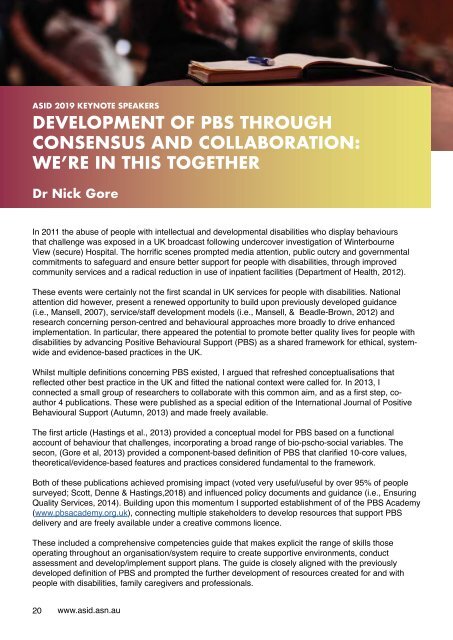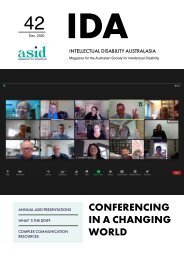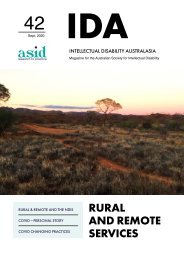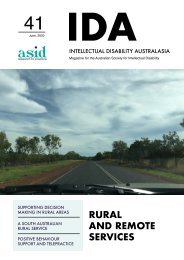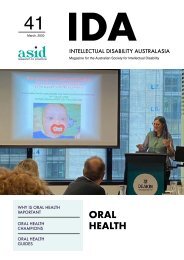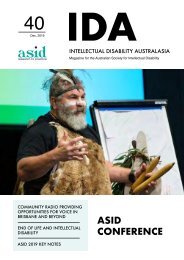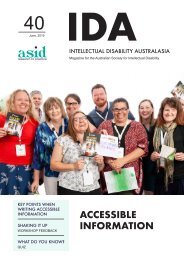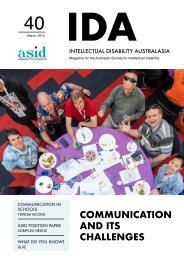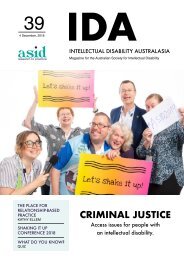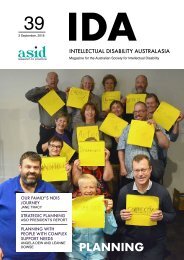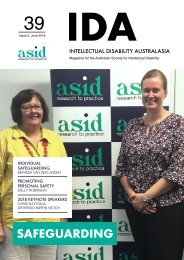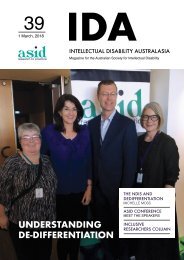IDA Magazine Vol 40 Iss 3 (Sep 2019)
- No tags were found...
You also want an ePaper? Increase the reach of your titles
YUMPU automatically turns print PDFs into web optimized ePapers that Google loves.
ASID <strong>2019</strong> KEYNOTE SPEAKERS<br />
DEVELOPMENT OF PBS THROUGH<br />
CONSENSUS AND COLLABORATION:<br />
WE’RE IN THIS TOGETHER<br />
Dr Nick Gore<br />
In 2011 the abuse of people with intellectual and developmental disabilities who display behaviours<br />
that challenge was exposed in a UK broadcast following undercover investigation of Winterbourne<br />
View (secure) Hospital. The horrific scenes prompted media attention, public outcry and governmental<br />
commitments to safeguard and ensure better support for people with disabilities, through improved<br />
community services and a radical reduction in use of inpatient facilities (Department of Health, 2012).<br />
These events were certainly not the first scandal in UK services for people with disabilities. National<br />
attention did however, present a renewed opportunity to build upon previously developed guidance<br />
(i.e., Mansell, 2007), service/staff development models (i.e., Mansell, & Beadle-Brown, 2012) and<br />
research concerning person-centred and behavioural approaches more broadly to drive enhanced<br />
implementation. In particular, there appeared the potential to promote better quality lives for people with<br />
disabilities by advancing Positive Behavioural Support (PBS) as a shared framework for ethical, systemwide<br />
and evidence-based practices in the UK.<br />
Whilst multiple definitions concerning PBS existed, I argued that refreshed conceptualisations that<br />
reflected other best practice in the UK and fitted the national context were called for. In 2013, I<br />
connected a small group of researchers to collaborate with this common aim, and as a first step, coauthor<br />
4 publications. These were published as a special edition of the International Journal of Positive<br />
Behavioural Support (Autumn, 2013) and made freely available.<br />
The first article (Hastings et al., 2013) provided a conceptual model for PBS based on a functional<br />
account of behaviour that challenges, incorporating a broad range of bio-pscho-social variables. The<br />
secon, (Gore et al, 2013) provided a component-based definition of PBS that clarified 10-core values,<br />
theoretical/evidence-based features and practices considered fundamental to the framework.<br />
Both of these publications achieved promising impact (voted very useful/useful by over 95% of people<br />
surveyed; Scott, Denne & Hastings,2018) and influenced policy documents and guidance (i.e., Ensuring<br />
Quality Services, 2014). Building upon this momentum I supported establishment of of the PBS Academy<br />
(www.pbsacademy.org.uk), connecting multiple stakeholders to develop resources that support PBS<br />
delivery and are freely available under a creative commons licence.<br />
These included a comprehensive competencies guide that makes explicit the range of skills those<br />
operating throughout an organisation/system require to create supportive environments, conduct<br />
assessment and develop/implement support plans. The guide is closely aligned with the previously<br />
developed definition of PBS and prompted the further development of resources created for and with<br />
people with disabilities, family caregivers and professionals.<br />
20 www.asid.asn.au


